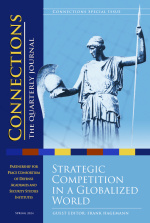The aim of this Connections issue is to explore the various aspects and implications of strategic competition in a globalized world. International politics will not be shaped solely by the two superpowers, the United States and China, struggling for dominance in different world regions. Several other states and groups of states will also influence the outcome of this competition. Considering a more complex constellation of actors opens up new perspectives on the political and economic challenges ahead and facilitates the exploration of approaches to bridge gaps with nonaligned countries.
The issue begins by examining the most important actors in international politics and then concentrates on the different world regions relevant to strategic competition. Finally, it explores cross-cutting trends and topics that will significantly influence the global outcome of this competition. As a result, it offers key takeaways: The Political West would be wise to recognize the perceptions and needs of nonaligned countries in the context of strategic competition. In this regard, China and Russia are perceived as adversaries of the West. Their narratives resonate strongly in many countries in the Global South. The Political West must regain the initiative and actively promote its competitive advantage. India holds critical importance in this context. Supporting the development of an additional pole in South Asia and fostering the rules-based liberal world order could help contain bilateral conflicts and reduce tensions at both global and regional levels.
Reviewed article
The Myth of Bipolarity: How to Understand Strategic Competition in a Globalized World
Article statistics
Bibliography
“Is There Really a Cold War 2.0? Inside the Debate on How to Think about the U.S.-China Rivalry,” Foreign Policy, June 11, 2023, https://foreignpolicy.com/2023/06/11/new-cold-war-2-us-china-russia-geopolitics/.
Aydıntaşbaş, Aslı, et al., “Strategic Interdependence: Europe’s New Approach in a World of Middle Powers,” Policy Brief, European Council on Foreign Relations, October 3, 2023, https://ecfr.eu/publication/strategic-interdependence-europes-new-approach-in-a-world-of-middle-powers/.
Bastian, Katrin, “The European Union and Strategic Competition,” Connections: The Quarterly Journal 23, no. 2 (2024): 70-89, https://doi.org/10.11610/Connections.23.2.11.
Bastian, Katrin, et al., “Perspectives on Strategic Competition,” George C. Marshall Center Policy Brief No. 1, November 2024, https://www.marshallcenter.org/en/publications/policy-briefs/perspectives-strategic-competition.
Brooks, Stephen G., and William C. Wohlforth, “The Myth of Multipolarity: American Power’s Staying Power,” Foreign Affairs 102, no. 3 (2023), https://www.foreignaffairs.com/united-states/china-multipolarity-myth.
Campbell, Andrew M., “Contending with a Rising China: A Comparative Study of Middle-Power Strategies in the Indo-Pacific,” Journal of Indo-Pacific Affairs 6, no. 1 (2023): 49-74. https://media.defense.gov/2023/feb/02/2003154179/-1/-1/1/_jipa_january-february%202023.pdf.
Colby, Elbridge, “The Return of Strategic Com-petition: How to Execute and Sustain the National Security Strategy,” in The Future of Conservative Internationalism, collection of essays delivered in Beaver Creek, Colorado, in July 2019, Reagan Institute Strategy Group, accessed April 18, 2024, https://www.reaganfoundation.org/reagan-institute/publications/the-return-of-strategic-competition-how-to-execute-and-sustain-the-national-security-strategy/.
Economy, Elizabeth, “China’s Alternative Order: And What America Should Learn from It,” Foreign Affairs 103, no. 3 (May/June 2024), https://www.foreignaffairs.com/china/chinas-alternative-order-xi-jinping-elizabeth-economy.
Ferguson, Niall, “America, China, Russia, and the Avalanche of History,” Bloomberg, May 20, 2022, https://www.bloomberg.com/opinion/articles/2022-05-20/niall-ferguson-america-china-russia-and-the-avalanche-of-history.
Gaddis, John Lewis, The Cold War: A New History (New York: The Penguin Press, 2005).
Herd, Graeme P., Falk Tettweiler, Katrin Bastian, and Frank Hagemann, “‘Normative Strategic Competition in an Era of Choice,’ Symposium Aide Memoire, Federal Ministry of Defence, Berlin, 14 March 2023,” The Clock Tower Security Series, George C. Marshall European Center for Security Studies, March 2023, https://www.marshallcenter.org/en/publications/clock-tower-security-series/normative-strategic-competition-era-choice/normative-strategic-competition-era-choice.
Herd, Graeme, “The Atlanticist Anglo-Saxon Reich and All That: How Russia Understands Strategic Confrontation,” Connections: The Quarterly Journal 23, no. 2 (2024): 44-69, https://doi.org/10.11610/Connections.23.2.04.
Holmila, Antero, “Re-thinking Nicholas J. Spykman: From Historical Sociology to Balance of Power,” The International History Review 42, no. 5 (2019): 951-966, https://doi.org/10.1080/07075332.2019.1655469.
Khan, Amjad Abbas, “Security Environment in South Asia: The Role of the Shanghai Cooperation Organisation,” in China and South Asia: Changing Regional Dynamics, Development and Power Play, ed. Rajiv Ranjan and Guo Changgang (London: Routledge India, 2021), 97-107.
Khanna, Parag, The Second World: How Emerging Powers Are Redefining Global Competition in the Twenty-first Century (New York, NY: Random House, 2009).
Lynch, Thomas F., “Major Findings on Contemporary Great Power Competition,” in Strategic Assessment 2020: Into a New Era of Great Power Competition, ed. Thomas F. Lynch III (Washington, D.C.: NDU Press, November 2020), https://ndupress.ndu.edu/Media/News/News-Article-View/Article/2404283/major-findings-on-contemporary-great-power-competition/.
Mackinder, Halford, “The Geographical Pivot to History,” The Geographical Journal 23, no. 4 (1904): 421-437, https://doi.org/10.2307/1775498.
Mahbubani, Kishore, “Asia’s Third Way: How ASEAN Survives—and Thrives—Amid Great-Power Competition,” Foreign Affairs 102, no. 2 (March/April 2023), https://www.foreignaffairs.com/southeast-asia/asias-third-way-asean-amid-great-power-competition.
Mastny, Vojtech, “The Soviet Union’s Partnership with India,” Journal of Cold War Studies 12, no. 3 (Summer 2010): 50-90, https://doi.org/10.1162/JCWS_a_00006.
Mazarr, Michael J., Bryan Frederick, and Yvonne K. Crane, “Understanding a New Era of Strategic Competition,” Research Report RR-A290-4 (Santa Monica, CA: RAND, November 2022), https://doi.org/10.7249/RRA290-4.
Nageswaran, V. Anantha, and Gurvinder Kaur, “Don’t Bet Against India: New Delhi’s Brewing Economic Comeback,” Foreign Affairs 102, no. 1 (January-February 2023), https://www.foreignaffairs.com/india/dont-bet-against-india.
OECD, Economic Outlook for Southeast Asia, China and India 2024: Developing amid Disaster Risks (Paris: OECD Publishing, 2024), https://doi.org/10.1787/3bbe7dfe-en.
Paul, Christopher, et al., “The Role of Information in U.S. Concepts for Strategic Competition,” Research Report RR-A1256-1 (Santa Monica, CA: RAND, 2022), 8-12, https://doi.org/10.7249/RRA1256-1.
Puglierin, Jana, and Pawel Zerka, “Keeping America Close, Russia Down, and China Far Away: How Europeans Navigate a Competitive World,” Policy Brief, European Council on Foreign Relations, June 7, 2023, https://ecfr.eu/publication/keeping-america-close-russia-down-and-china-far-away-how-europeans-navigate-a-competitive-world/.
Ranjan, Amit, “India’s Foreign Policy: Shift, Adjustment and Continuity,” The Round Table 111, no. 3 (2022): 381-384, https://doi.org/10.1080/00358533.2022.2082737.
Spykman, Nicholas J., The Geography of the Peace (New York: Harcourt, Brace and Company, 1944).
Waltz, Kenneth N., Theory of International Politics (Reading, MA: Addison-Wesley, 1979).
Wilkins, Thomas, “Middle Power Hedging in the Era of Security/Economic Disconnect: Australia, Japan, and the ‘Special Strategic Partner-ship’,” International Relations of the Asia-Pacific 23, no. 1 (January 2023): 93-127, https://doi.org/10.1093/irap/lcab023.
Winkler, Stephanie Christine, “Strategic Competition and US-China Relations: A Conceptual Analysis,” The Chinese Journal of International Politics 16, no. 3 (Autumn 2023): 333–356, https://doi.org/10.1093/cjip/poad008.

